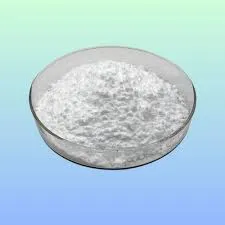
Oct . 12, 2024 01:58 Back to list
Exploring the Applications and Benefits of Hydroxyethyl Cellulose in Various Industries
Hydroxyethyl Cellulose Applications, Properties, and Benefits
Hydroxyethyl cellulose (HEC) is a water-soluble polymer derived from cellulose, one of the most abundant organic polymers found in nature. This compound is synthesized by the etherification of cellulose with ethylene oxide, resulting in a product that possesses unique properties, making it highly valuable across various industries. With applications ranging from pharmaceuticals to food products, hydroxyethyl cellulose plays a crucial role in enhancing the performance and stability of formulations.
Chemical Properties and Characteristics
Hydroxyethyl cellulose is a white, odorless powder that is biodegradable and non-toxic. Its molecular weight can vary significantly depending on the source and synthesis conditions, resulting in different viscosity and solubility characteristics. HEC is soluble in cold and hot water, forming a clear, viscous solution. This property makes it an excellent thickening agent, stabilizer, and emulsifier.
One of the critical features of hydroxyethyl cellulose is its ability to form gels at elevated temperatures, a property known as thermoreversibility. This characteristic is particularly useful in applications where a change in temperature can affect the performance of a product. Additionally, HEC exhibits pseudoplastic behavior, meaning its viscosity decreases under shear stress. This property allows formulations to flow easily during application, yet thickens upon standing, providing stability and preventing settling.
Applications in Various Industries
1. Pharmaceuticals In the pharmaceutical industry, hydroxyethyl cellulose is widely used as a binder in tablet formulations and as a thickener in suspensions and gels. Its film-forming ability helps improve the release profile of active ingredients, enhancing bioavailability and ensuring consistent dosage. HEC is also utilized in ophthalmic solutions for its ability to enhance the viscosity and prolong the contact time of drugs with the ocular surface.
hydroxyéthyl cellulose

2. Cosmetics and Personal Care HEC is a popular ingredient in cosmetics and personal care products, including lotions, shampoos, and gels. Its thickening and stabilizing properties help improve the texture and overall feel of formulations. Hydroxyethyl cellulose also provides moisture retention, making it an excellent choice for hydrating products. Furthermore, its gentle nature makes it suitable for sensitive skin formulations.
3. Food Industry In the food industry, hydroxyethyl cellulose is used as a thickener, stabilizer, and texturizer. Its ability to retain moisture helps improve the shelf life and texture of various food products, including salad dressings, sauces, and dairy products. HEC is also employed in gluten-free baking, where it contributes to the elasticity and structure of baked goods.
4. Construction HEC is frequently added to cement and mortar formulations to enhance their workability and adhesion. When mixed with water, hydroxyethyl cellulose increases the viscosity of the mixture, allowing for better control over the application. This characteristic helps prevent the segregation of components and ensures a more uniform finish.
Environmental and Safety Considerations
One of the significant advantages of hydroxyethyl cellulose is its biodegradability and non-toxic nature. It poses minimal risk to human health and the environment, making it an attractive option compared to synthetic polymers. As consumers become increasingly aware of environmental issues, the demand for eco-friendly alternatives in various formulations is rising, and HEC fits perfectly within this trend.
Conclusion
Hydroxyethyl cellulose is a versatile and valuable polymer with a wide range of applications across different industries. Its unique properties, including thickening, stabilizing, and moisture-retaining capabilities, make it an essential ingredient in pharmaceuticals, cosmetics, food products, and construction materials. As the focus on sustainability continues to grow, the future looks promising for hydroxyethyl cellulose, as its biodegradable nature and non-toxic characteristics align with the global shift towards environmentally conscious practices. With ongoing research and development, the potential applications and benefits of hydroxyethyl cellulose are expected to expand even further.
-
Versatile Hpmc Uses in Different Industries
NewsJun.19,2025
-
Redispersible Powder's Role in Enhancing Durability of Construction Products
NewsJun.19,2025
-
Hydroxyethyl Cellulose Applications Driving Green Industrial Processes
NewsJun.19,2025
-
Exploring Different Redispersible Polymer Powder
NewsJun.19,2025
-
Choosing the Right Mortar Bonding Agent
NewsJun.19,2025
-
Applications and Significance of China Hpmc in Modern Industries
NewsJun.19,2025







